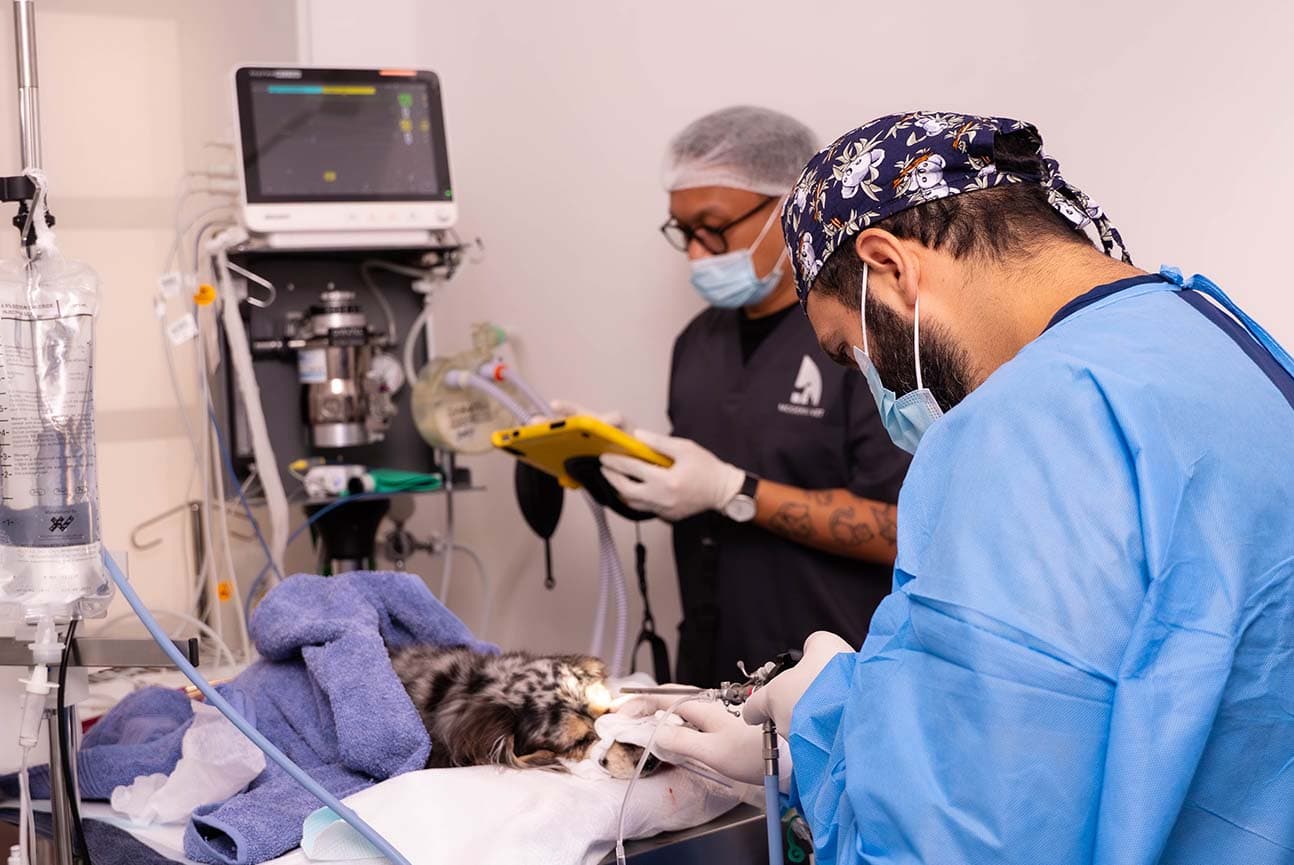Reviewed by Dr. Rami Mdawar
Updated on 07/10/2025
Reading time 4 min.
Overview
Severity: Low
Life stage: All
An abscess is an enclosed pocket of pus caused by bacterial infection. These painful swellings can develop anywhere on your dog’s body, from simple skin infections to more serious internal complications. Dubai’s hot, sandy environment creates particular challenges, with grass seeds, sand particles, and increased outdoor activities during cooler months contributing to abscess formation. Most abscesses respond well to prompt veterinary treatment, but some internal types can become life-threatening without immediate and intensive veterinary care.
What to do if you think your dog has an abscess
Contact a veterinarian immediately. Abscesses are painful and typically require prescription medication for proper resolution.
Immediate care whilst waiting for your appointment:
- Apply warm compresses to external abscesses for 10-15 minutes, several times daily
- Clean any discharge gently with cooled, boiled water to prevent crusting
- Use a cone collar or medical suit to prevent licking and further contamination
- Provide a cool, quiet resting area away from the heat
- Monitor eating and drinking habits closely
- Avoid attempting to squeeze or drain the abscess yourself
Safety precautions: Be cautious when handling painful dogs. They may become defensive or aggressive. If your dog shows signs of aggression during treatment attempts, step back and seek immediate veterinary care.
Modern Vets’ 24-hour emergency veterinary services are readily available when you need urgent help!
Causes of abscesses in dogs
Dubai’s environment and lifestyle factors contribute to various abscess types.
Skin abscesses:
- Penetration of foreign material, such as grass seeds, thorns, sand particles
- Bite wounds from other animals during park visits or encounters
- Scratches from rough surfaces or aggressive play
- Contaminated wounds from Dubai’s dusty environment
Dental abscesses:
- Poor oral hygiene, aggravated by Dubai’s dry climate
- Tooth root infections from accumulated tartar (scale)
- Broken teeth from chewing on inappropriate objects
- Progression of advanced periodontal disease
Anal gland abscesses:
- Blocked anal glands due to soft stool consistency
- Bacterial infection of impacted anal glands
Other types:
- Prostate abscesses in unneutered male dogs
- Post-operative infections at surgical wound sites
- Internal abscesses from blood-borne bacterial infections
Dubai’s seasonal patterns influence abscess occurrence, with more cases during cooler months when dogs spend more time outdoors exploring parks and beaches.
When to worry
Contact your veterinarian immediately if your dog:
- Shows obvious pain when touching or moving
- Refuses food or water for more than 24 hours
- Has blood in urine or difficulty urinating (peeing)
- Develops a high fever, with lethargy and weakness
- Has an abscess that is rapidly swelling or redness is spreading
- Develops difficulty breathing or walking
Arrange an urgent vet appointment for:
- Facial swelling
- Difficulty opening the mouth or eating
- Behavioural changes, such as unusual aggression when approached
Recommended products
Essential supplies for managing abscesses in Dubai’s climate include:
Wound care essentials
- Sterile saline solution for gentle cleaning
- Cone collars or medical suits in your dog’s size
Comfort items
- Cooling mats for Dubai’s hot weather
- Soft bedding for comfortable rest
- Elevated food and water bowls
- Non-slip mats for safer movement
Preventive products
- High-quality dog toothbrushes and enzymatic toothpaste
- Dental chews with veterinary approval
- Protective paw balms for rough terrain
- First aid kits containing antiseptic wipes
Dietary support
- High-fibre supplements for anal gland health
- Probiotics supporting immune function
- Adequate water sources for hydration
Prevention of abscesses in dogs
Preventing abscesses requires care adapted to Dubai’s environment.
Daily inspection routine:
- Check paws thoroughly after walks, rinsing off sand and debris
- Examine the coat for embedded grass seeds, especially between toes and under ear flaps
- Monitor for cuts or scratches from playground equipment or rough surfaces
- Assess mouth and teeth during regular grooming sessions
Environmental management:
- Avoid areas with lots of grass seeds during peak seasons
- Choose appropriate walking surfaces to minimise paw injuries
- Supervise interactions with other dogs in popular Dubai parks
- Provide adequate shade and cooling during outdoor activities
Health maintenance:
- Schedule dental examinations every 6-12 months
- Brush your dog’s teeth regularly and consistently with dog-appropriate products
- Check anal glands regularly, especially in breeds predisposed to problems
- Consider neutering male dogs to prevent prostate abscesses
Wound care advice:
- Clean minor cuts immediately with sterile saline
- Apply protective barriers to prevent contamination
- Seek veterinary attention for animal bites or deep wounds
- Keep an eye on how wounds are healing and check for signs of infection
How vets diagnose abscesses in dogs
Physical examination:
- Thorough inspection of affected areas
- Gentle palpation to assess size, consistency and how painful the area is
- Checking temperature to rule out systemic illness
- Evaluation of the health of the surrounding skin/tissue
Diagnostic procedures:
- Fine needle aspiration for bacterial culture and sensitivity testing
- Blood tests: assessing white (defensive) cell counts and organ function
- Urinalysis: checking a urine sample when urinary symptoms are present
- Imaging: ultrasound, x-rays, for internal abscesses
- Advanced imaging: CT, MRI for complex cases
Specific assessments:
- Dental x-rays for suspected tooth root abscesses
- Rectal examination to check the prostate gland (male dogs)
- Microscope exam of samples of discharge: checking what cells are present
- Allergy testing: if skin abscesses are recurrent
How to help your dog at home
Once veterinary treatment begins, supportive home care helps speed recovery.
Managing medication:
- Give antibiotics exactly as prescribed, at the correct time and dose, and always complete the full course
- Contact your vet if you think the medication causes side effects
Wound care routines:
- Clean draining abscesses with sterile saline if directed to do so by your vet
- Apply warm compresses 2-3 times daily for comfort
Environmental adaptations:
- Provide cool, comfortable resting areas away from Dubai’s heat
- Limit exercise and outdoor exposure during the initial healing phase
- Offer light, easily-digested foods if appetite is reduced
- Ensure constant access to fresh water for hydration
Monitoring protocol:
- Document healing progress with daily photographs
- Keep a note of eating, drinking, and toileting habits
- Watch for signs of spreading infection or complications
- Schedule follow-up appointments, as recommended by your vet
How vets treat abscesses in dogs
Veterinary treatment depends on the location and severity of the abscess.
Standard procedures:
- Sedation or anaesthesia for thorough examination and treatment
- Surgical drainage with removal of all the infected material
- Flushing with sterile solutions to remove bacteria
- Placement of drainage tubes when needed
Specific interventions:
- Tooth extraction for dental abscesses
- Anal gland expression and flushing
- Foreign body removal from penetrating wounds
- Castration as part of prostatic abscess prevention and treatment
Post-procedural care:
- Prescription antibiotics targeting specific bacteria
- Pain management with appropriate medication
- Anti-inflammatory drugs to reduce swelling and discomfort
- Wound care instructions, tailored to Dubai’s climate
Advanced treatments:
- Culture-guided antibiotic selection for resistant infections
- Reconstructive surgery is required where an abscess causes extensive tissue damage
- Specialised drainage systems for complex internal abscesses
- Referral to specialists when advanced procedures are needed
What are the risk factors for abscesses in dogs?
Any dog can get an abscess, but some factors increase the risk.
Breed risks:
- Small breeds: have a greater risk of dental disease and anal gland problems
- Brachycephalic (short-faced) breeds: suffer from dental crowding and skin fold infections
- Long-haired breeds: tendency to trap grass seeds and get irritated skin
Age considerations:
- Older dogs: poorer immune defences, dental disease, prostate disease (unneutered males)
- Young dogs: more susceptible to injuries in play and exploration
Lifestyle factors:
- Active outdoor dogs: more risk of foreign bodies and fights/wounds
- Dogs with poor dental care: risk of tooth root abscess
- Overweight dogs: prone to anal gland impaction and skin fold infections
Health conditions:
- Diabetes: leads to impaired wound healing
- Allergic skin disease: more scratching and risk of secondary infection
- Immune system diseases: reduced resistance to infection
- Previous history of abscesses: a higher possibility of recurrence
Worried about your dog’s abscess symptoms? Book a checkup or emergency appointment today at Modern Vet Hospital in Dubai. Their experienced veterinary team provides comprehensive diagnostic services, abscess treatment, and ongoing care tailored to your dog’s specific needs. From routine abscess drainage to complex surgical interventions, Modern Vet Hospital is your trusted veterinary clinic in Dubai for complete, compassionate canine care.
Share this, choose your platform!
Reviewed by
Dr. Rami Mdawar
Medical Manager DVM MVSc, Gp Cert (Endo), DISAMS, DSISAS.
Dr. Rami was born and raised in Lebanon. His love for medicine and his affinity towards animals developed as he grew older; He knew there and then that veterinary medicine was his calling. He graduated from the Lebanese University in Beirut, Lebanon in 2014 and subsequently relocated to France where he participated in a one-year internship program with a focus on small animal medicine and surgery at the Veterinary Teaching Hospital of Toulouse.


